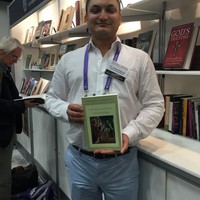- History, Philosophy, Religion, Theology, Classics, Indian Philosophy, and 14 moreIndian studies, German Studies, Anti-Semitism, Indology, Religious Studies, Religious Studies /Indology, Mahabharata, South Asian Studies, Classical Indology, History of Religion, Sanskrit language and literature, Hindu Studies, Hinduism, and Orientalismedit
- Professor Bagchee holds a PhD in Philosophy from New School for Social Research, New York. His areas of expertise are... moreProfessor Bagchee holds a PhD in Philosophy from New School for Social Research, New York. His areas of expertise are twentieth-century Continental philosophy, German Romanticism, Nietzsche, philology, and the Western reception of Indian thought.edit
Research Interests:
Research Interests:
Paper presented at the 2022 Annual Meeting of the Society for Hindu-Christian Studies
Research Interests:
Research Interests:
Paper presented at Heidegger Circle Conference 2022
Research Interests:
Research Interests:
Research Interests:
Research Interests:
Research Interests:
Research Interests:
Research Interests:
Research Interests: German Studies, Anthropology, Race and Racism, Sanskrit language and literature, Indo-European Studies, and 10 moreCritical Race Theory, Sanskrit, Holocaust Studies, Philosophy Of Race, Indo-European Linguistics, Orientalism, Indian History, Indology, Religious Studies /Indology, and Indo-German literary relations
Canadian Journal of History 51, no. 1 (2016): 224–26
Research Interests:
Presentation for the “Translation: Heidegger in Conversation” Panel
56th Annual Meeting of the Heidegger Circle, May 26–29, 2022, The University of Memphis
56th Annual Meeting of the Heidegger Circle, May 26–29, 2022, The University of Memphis
Research Interests:
This is a report on DICSEP: the triennial conference on the Sanskrit epics and Purāṇas held in Dubrovnik from September 21-26, 2020. The recently concluded conference was the ninth in the series. The author's association with the... more
This is a report on DICSEP: the triennial conference on the Sanskrit epics and Purāṇas held in Dubrovnik from September 21-26, 2020. The recently concluded conference was the ninth in the series. The author's association with the conference extends back to the fifth meeting (in 2008). He has attended every meeting since. This report provides a review of the methodology and academic quality of the papers presented along with an assessment of the impact of COVID-19 on this year's conference and the future prospects of the conference series.
Research Interests:
Research Interests:
I remember being fascinated by limits – 5in10 with Joydeep Bagchee
Research Interests:
Archival photographs and documents for Paul Thieme
